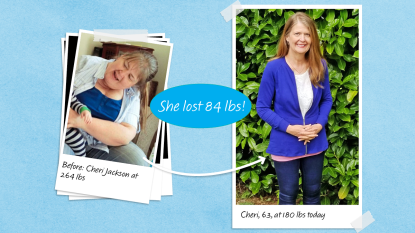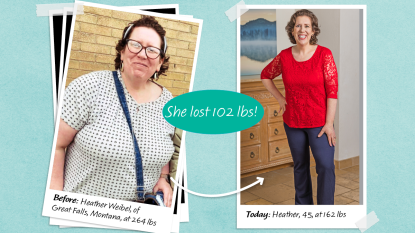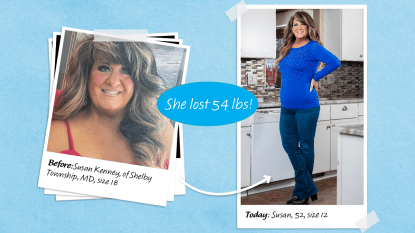10 Tips to Combat Winter Weight Gain

Sitting by the fire with a mug of hot chocolate or a glass of red wine sounds so much more inviting than running through puddles or shivering as you cycle. But as we already know, ditching your workout in favor of extra calories is the perfect recipe for unwanted weight gain during the colder months. We spoke to Caitlin Reid, dietitian and exercise physiologist from Health & the City, and she gave us her top 10 tips for beating the bulge this winter.
1. Eat more protein.
Protein helps you feel satisfied longer, reducing the likelihood of overeating. Protein-rich foods such as lean meat provide critical nutrients, such as iron, that may be lacking in your diet. Being low in iron can make you feel tired, unwell, and lacking motivation to exercise and eat healthy. Spread your protein intake out evenly throughout the day, and include a source of protein like meat, fish, legumes, dairy foods, or nuts at every meal.
2. Take control of your environment.
Hidden persuaders around us make us overeat without us even realizing it. Here’s how to manage your surroundings:
- Limit your access to fattening foods. Don’t keep high-calorie comfort foods, such as cookies and chocolate, in the house.
- Eliminate distractions. Turn off the TV or radio while eating so your body realizes when it has had enough.
- Downsize your portions. Eating food off of smaller bowls and plates will really help you eat less.
- Listen to yourself. Are you eating because you’re really hungry, or because you’re tired and stressed?
3. Eat slowly.
When you walk through the door starving after a long day at work, it can be difficult not to chow down on whatever food is put in front of us. Instead, take your time with your meal. Sit at the table — not on the couch in front of the TV — and chew slowly. Why? It takes about 20 minutes for your brain to register that you’re full. Eat too quickly and it’s likely that you’ll eat much more than you actually need. Taking the time to enjoy the eating experience — including the taste and texture of foods — helps promote a sense of satisfaction for the entire meal.
4. Keep moving.
Exercise not only keeps you warm, it also helps you burn off the calories you consume. The ability of exercise to maintain your weight should not be underestimated. For the best benefits, you need to be consistent with your training. Aim for at least one hour of moderate-intensity exercise at least five times per week, and your waistline will thank you.
5. Limit the comfort food.
When it’s miserable outside, we want the foods that warm us up and comfort us. Creamy pasta dishes may taste great, but eating these rich foods each night makes it hard to maintain your weight during the winter, especially if you don’t control the portion sizes. Limit the comfort food to every other week and enjoy hot soups or steamed vegetables and lean meats most nights for dinner.
6. Weigh in regularly.
Bulky sweaters are a cozy way of getting through winter, but it’s easy for those extra couple of pounds to creep on without you realizing it. Keep tabs on your weight by stepping on the scale at the same time on the same day every week. Don’t have a scale? Wear your skinny jeans or a tight dress or skirt to keep your weight in check.
7. Drink herbal tea between meals.
Virtually calorie-free (without milk or sugar), tea is the perfect way to keep you warm and satisfied this winter. Instead of choosing calorie-laden hot chocolates, enjoy an old-fashioned cup of tea.
8. Warm up with soup.
Soup not only provides warmth during the cold months, it’s also fantastic for keeping your waistline in check. Soup is low in calories and it can also help us feel fuller on fewer calories. A low-calorie soup (steer clear of the creamy recipes) is perfect for warding off winter weight woes.
9. Sit down to eat.
Sit down at the table every time you eat. Don’t eat at your desk, in your car, on the train, or on the sofa. Treat every meal and snack with respect and you’ll be less likely to use your fork (or hand) as a shovel. Mindful eating is the smart way to eat.
10. Don’t share food.
Communal food plates that you share with friends often lead to overeating, say researchers from the State University of New York at Buffalo. People often eat to match the intake of the people that they’re eating with. If you’re out with a friend who is a big eater, it might mean too much food for you. Try selecting your own personal dish off the menu, and stop eating as soon as you feel satisfied.
This article was originally written by Now to Love editors. For more, check out our sisters site, Now to Love.
More From FIRST
What Happens To Your Gut Health When You Go on a Low-Gluten Diet?
9 Easy Keto Dessert Recipes to Help You Kiss Carbs Goodbye
Harness the Power of Celery Juice to Lose Weight and Heal Your Thyroid on This 30-Day Cleanse













